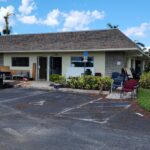In the wake of Hurricane Ian, Florida’s chief financial officer has taken a hard line on insurance claims litigation, calling for an outright ban on assignments-of-benefits agreements.
At a press conference in Cape Coral, a city hit hard by the hurricane this month, and in a statement Wednesday, CFO Jimmy Patronis also urged Florida lawmakers to establish a statewide insurance fraud prosecutor and to disincentivize public adjusters after a storm.
“We have bad public adjusters swarming impacted areas, soliciting, and trying to make a quick buck,” Patronis said. “Not only do individuals need more time to get out of a public adjuster contract during a state of emergency, we need to reduce the percentage a public adjuster is entitled to immediately following a storm, ensuring their motives are aligned with helping Floridians get back on their feet.”

Patronis, whose Department of Financial Services regulates adjusters, did not say what he based the “bad adjusters” assertion on. But some Florida insurers have long complained about public adjusters working closely with contractors and promising homeowners free roofs after a windstorm, leading to exaggerated claims and litigation.
The CFO also did not provide details on his proposed schedule of fees for adjusters.
The call for an end to assignments of benefits, or AOBs, has already met with support from one insurance industry leader.
“We commend the CFO for calling attention to ongoing abuse of assignment-of-benefits tools by shady vendors whose goal is profit above all else,” said Michael Carlson, president of the Personal Insurance Federation of Florida, which represents a number of insurance carriers. “Eliminating post-loss assignments that transfer consumer rights to vendors is a good idea. We also believe that addressing exorbitant public adjuster fees is another good idea and a means to reduce predatory behavior by these licensees.”
Several Florida insurance executives in recent years have called for statutory changes that would allow insurance policies to bar AOB agreements, noting that thousands of lawsuits in recent years have resulted from disputed AOB claims. Data from CaseGlide, a litigation management software firm, shows that as much as 41 percent of litigated claims against Florida’s largest insurers resulted from assignees of benefits, usually from restoration contractors. In July, the AOB share of new litigations reached an 18-month high, the company said. That came despite 2019 Florida legislation that aimed to reduce AOB suits.
A number of other states allow insurance policies to include non-assignment of benefits clauses.
Carlson said that claims litigation is “the storm after the storm,” and that one-way attorney fees also need to be addressed to disincentivize unnecessary lawsuits.
The Florida Association of Public Adjusters pushed back on Patronis’ agenda.
“We are concerned that the recent release misrepresents the important role and work of licensed public adjusters,” FAPIA President Chris Cury said in a statement Thursday.
Instead of bad actors in the hurricane zone in southwest Florida, “it appears there is a focus on lawful and licensed insurance professionals who are truly working to help policyholders in their time of need.”
Cury noted that, following a declared emergency, adjuster fees already are limited to no more than 10% of any claim made in the first year after the loss.
“Licensed public adjusters, who are regulated by the Department of Financial Services, adhere to strict standards and continue to serve in an essential capacity for the sake of policyholders,” Cury said.
Some adjusters and claimants’ attorneys have maintained that public adjusters help homeowners achieve a fair payout on claims, while insurance companies sometimes try to minimize the extent of damages. Insurance industry advocates have often blamed the adjusters for advertising heavily after storms and encouraging inflated claims.
Patronis did not call for another special session of the Florida Legislature to adopt the reforms, as some industry advocates have done, but referred to “this coming legislative session.” The 2023 regular session begins in March.
Patronis also reiterated his call for a $3 million anti-fraud and public education campaign.
“Policyholders need to understand what they are signing, and that litigation will only slow down their claims and could result in liens on their property,” Patronis said.
(This article was published on Friday by Insurance Journal. Reporter Will Rabb is the Southeast Editor of Insurance Journal)





















 New Texas Law Requires Insurers Provide Reason for Declining or Canceling Policies
New Texas Law Requires Insurers Provide Reason for Declining or Canceling Policies  State Farm Mutual to Pay $5B Dividend to Auto Insurance Customers
State Farm Mutual to Pay $5B Dividend to Auto Insurance Customers  Teens’ First Year on the Road Most Deadly
Teens’ First Year on the Road Most Deadly  Is Risk the Main Ingredient in Ultra-Processed Food?
Is Risk the Main Ingredient in Ultra-Processed Food? 






